Importance of Enzymes in the Brewing Process
Enzymes play a vital role in the brewing process, breaking down complex molecules to improve efficiency and influence the flavor of beer. Some common enzymes used in brewing include: Alpha-amylase: Breaks down large starch molecules into smaller sugars called dextrins, which improves the body and mouthfeel of the beer Beta-glucanase: A key enzyme in the malting and mashing processes, often obtained from barley Protease: Speeds up the growth of yeast, the mashing process, and wort fermenting Glucoamylase: Breaks down malt sugars further to create a drier, lower carb beer Here are some other things to know about enzymes in brewing: Enzymes are most active at a specific temperature and pH level. Enzymes are fragile but reusable. The addition of exogenous enzymes allows for the regulation of starch hydrolysis, assimilable nitrogen levels, and wort filterability. Temperature rests at a constant temperature can enable the hydrolysis of starch into fermentable sugars. The optimal temperature rest is chosen based on the enzymatic activity
11/27/20241 min read


My post content
SERVING GLOBALLY
Brazil | UAE | India | Europe | Argentina | Bangladesh | Malaysia | Indonesia | Afghanistan | Ecuador | Moldova | Turkey | Philippines | Algeria | Romania | Thailand | Vietnam | Nepal | Mexico | Honduras | Georgia | Venezuela | Peru | Spain | Tanzania | Columbia | Azerbaijan | Australia | Austria | Belgium | Canada | Czech Republic | Denmark | Finland | France | Germany | Greece | Hong Kong | Hungary | Iceland | Ireland | Israel | Italy | Japan | Korea | Luxembourg | Malaysia | Netherlands | New Zealand | Norway | Poland | Qatar | Romania | Singapore | Spain | Sweden | Switzerland | Taiwan | Turkey | United Kingdom | United States
CALL / WHATSAPP 01169310523

